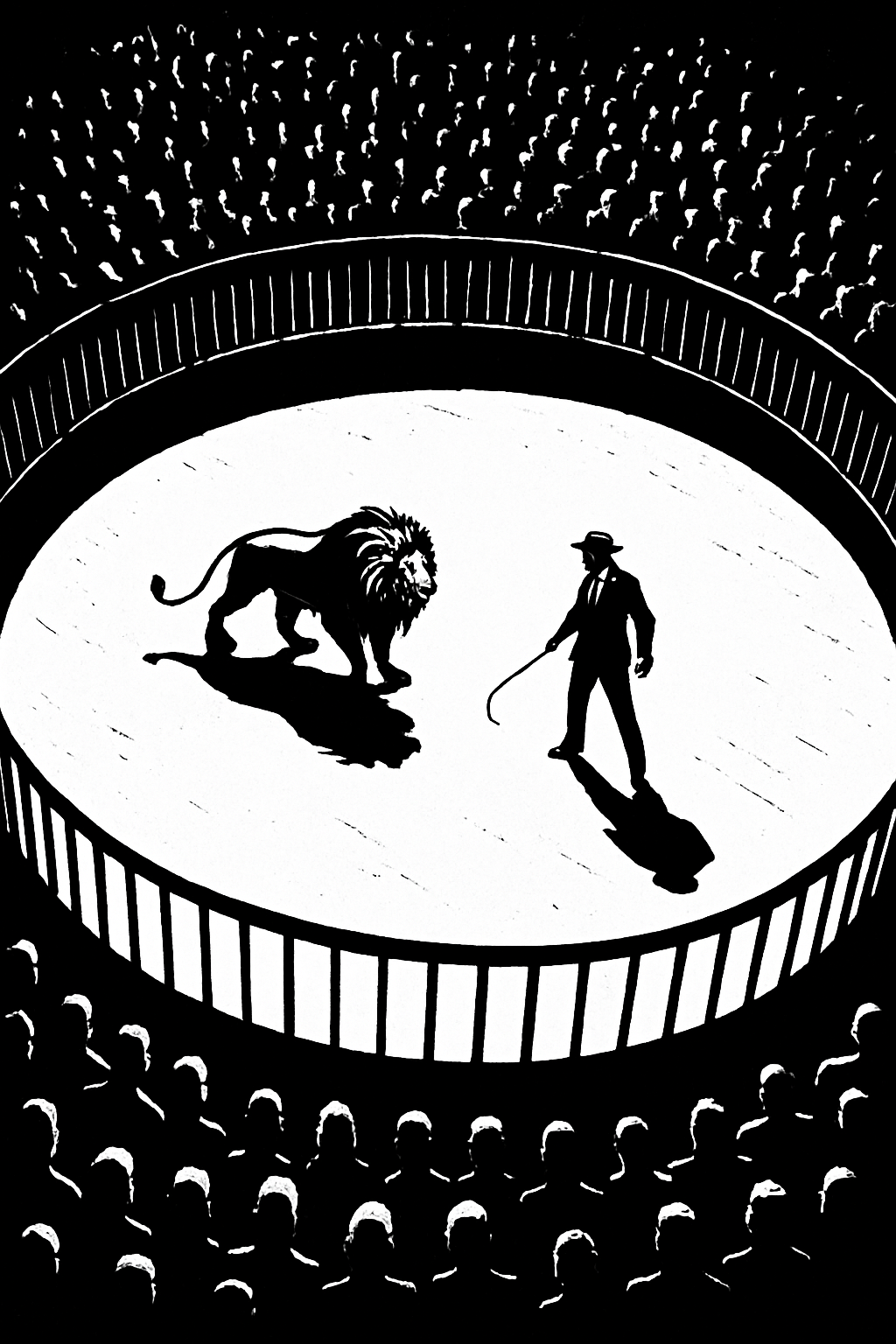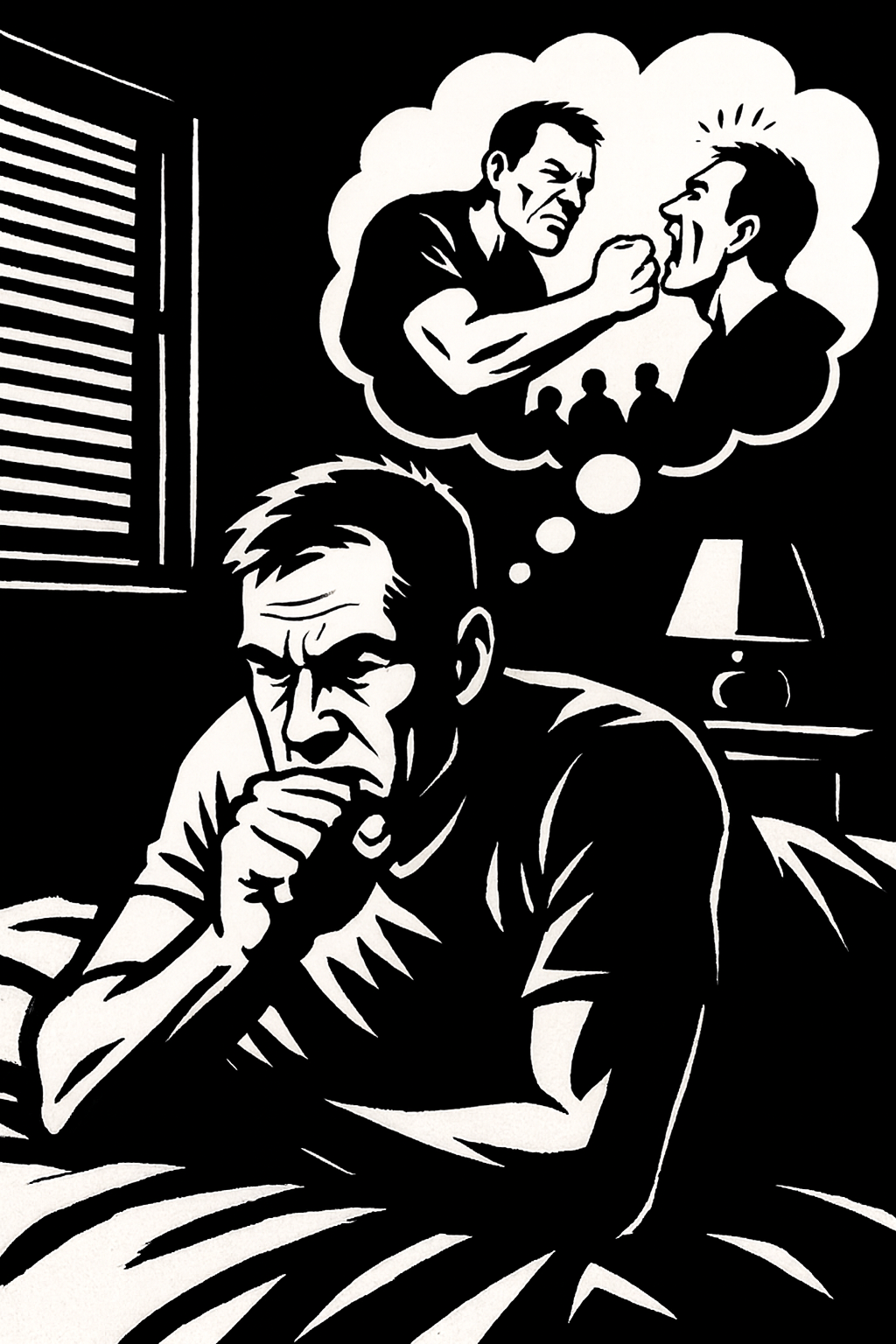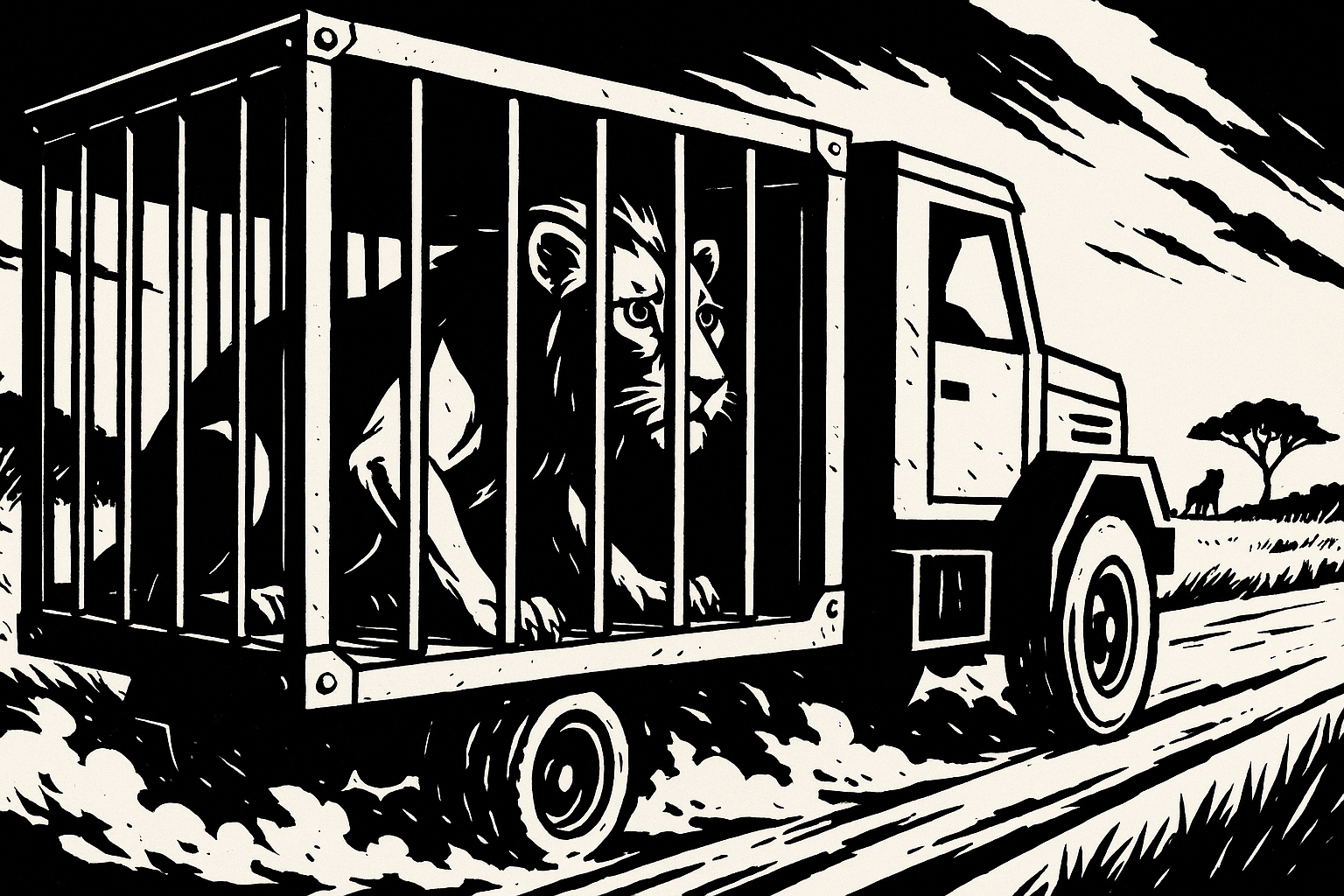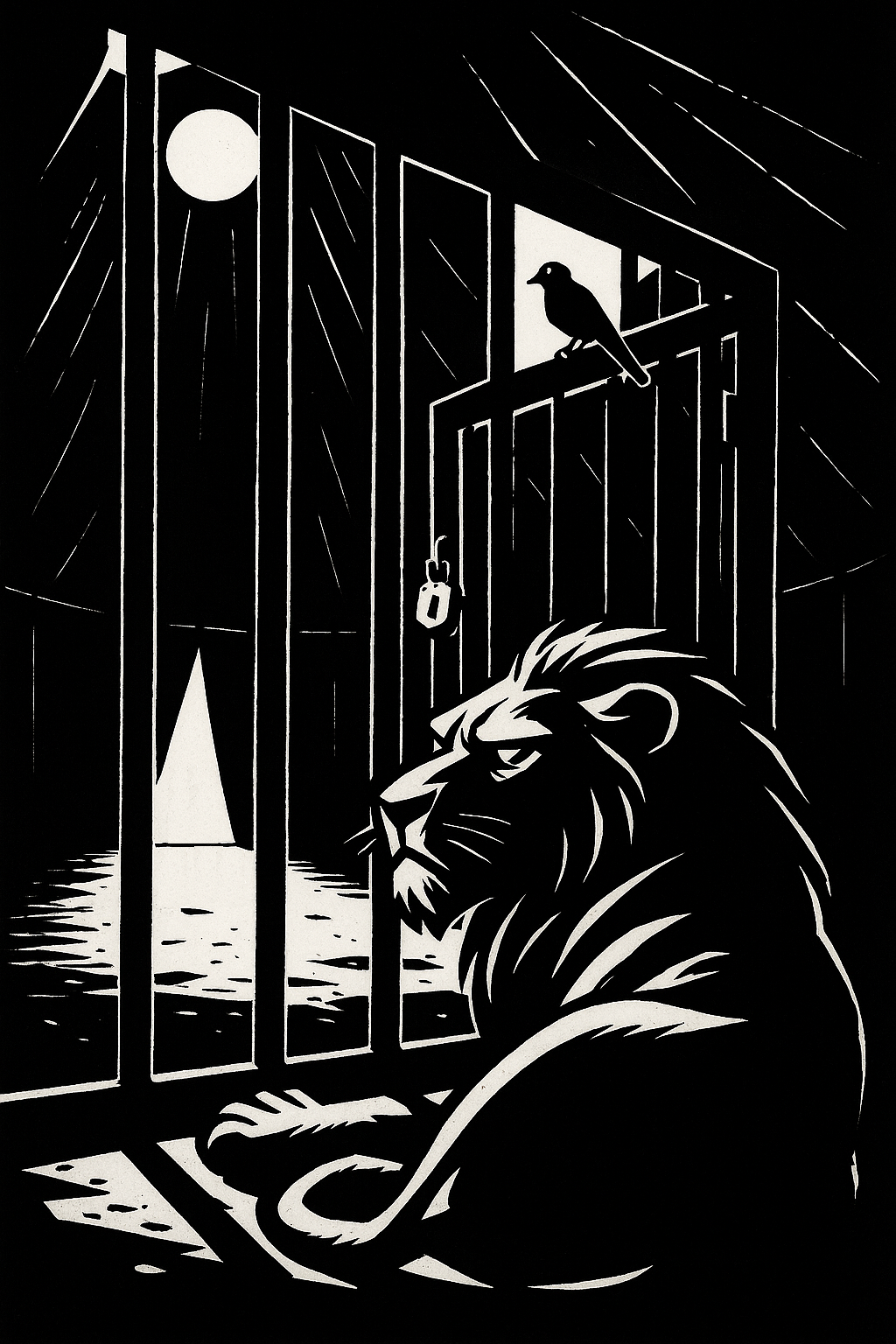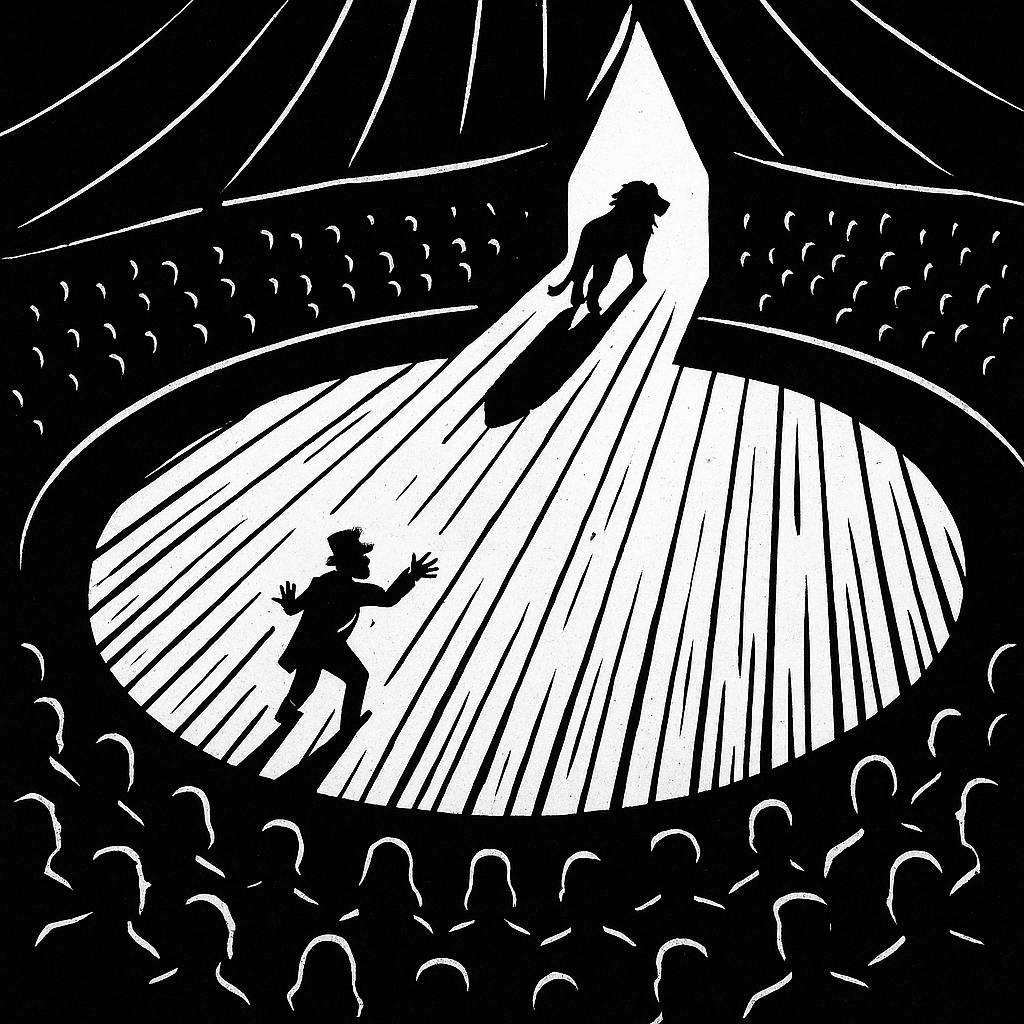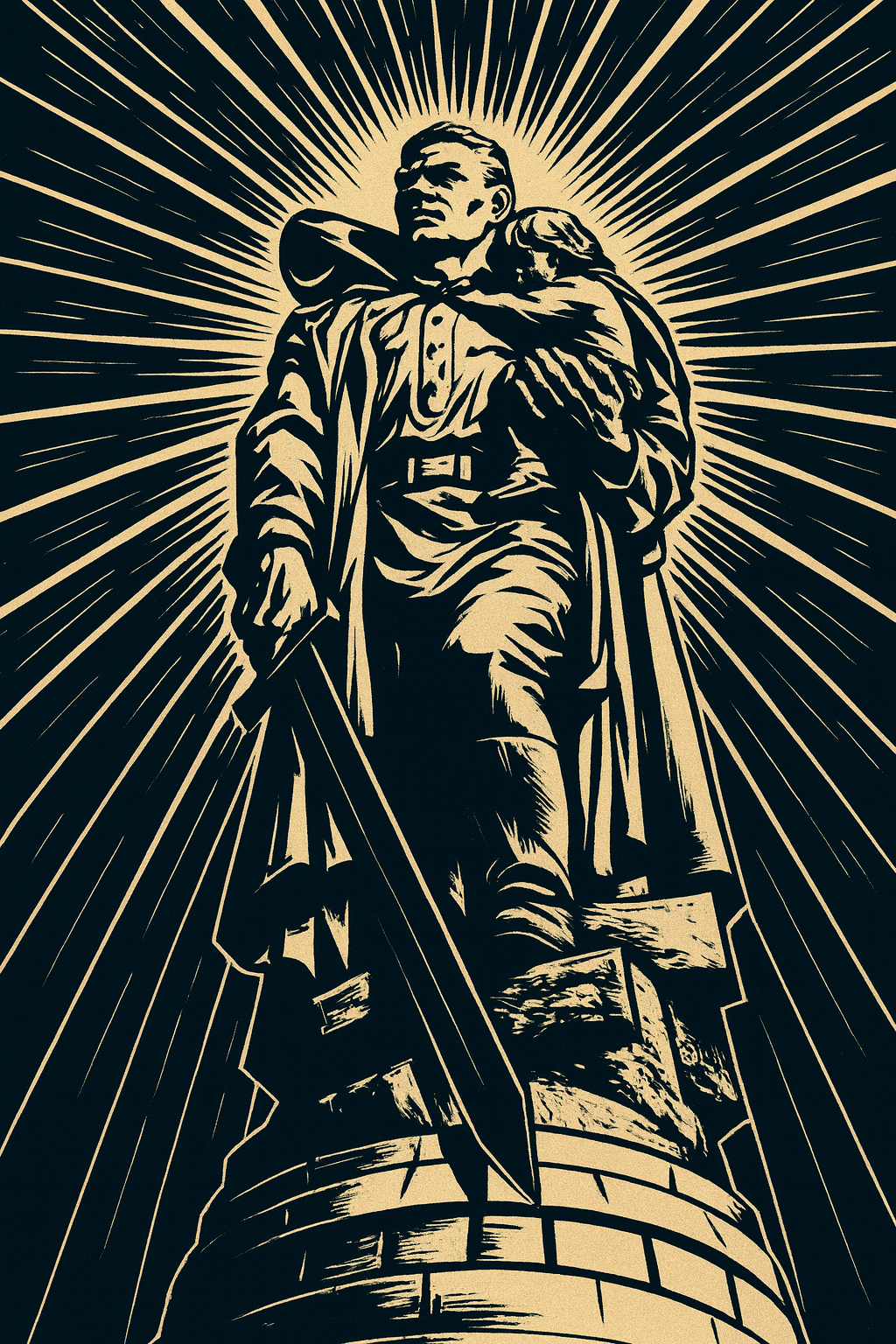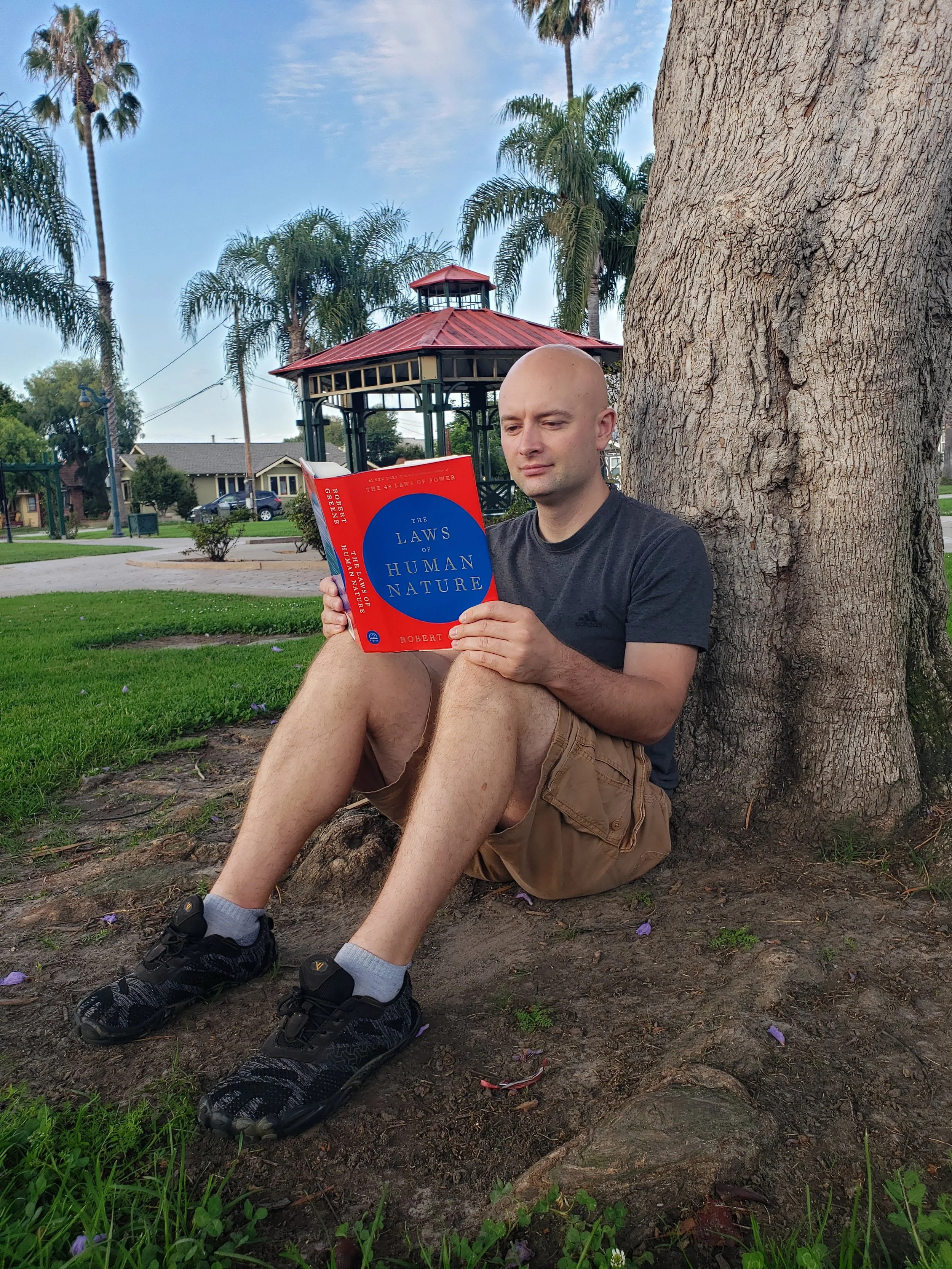Revenge on Your Mind
The True Meaning of Revenge Fantasies
By Damodar Roe
Have you ever lied awake at night, playing out the perfect revenge in your mind? The line that shuts her up. The punch that drops him cold. The moment when everyone finally realizes you were right all along.
It’s not just the betrayal that keeps you up. It’s the abandonment. The person who wronged you broke trust. But everyone else, the ones who should have defended you, stayed silent. They let it happen. So now, the dream isn’t only about shaming the wrongdoer, but proving you didn’t need the crowd to know that you were right.
You picture your revenge on the perfect stage. But this time, the tables are turned. It’s a vision that redeems your proper position. And you memorize this vision of justice like a tattoo on your mind. Remembrance is your ink and needle. You vow to retrace this vision over and over until the sweet day comes when you can finally make it a reality. This is natural human psychology.
But what are the practical effects of this? Why is it that you’re the one who’s losing sleep, and not them? What is it that’s making you feel good about the desire to harm someone? If you count how many times you’ve imagined revenge, how has that practically changed things in your life for the better?
These questions divide people into two camps:
Those who double down.
Those who take ownership.
There’s one camp who doubles down. They say:
“Oh wow, so now it’s my fault that I’m ‘losing sleep’? That’s rich. That’s what people say when they’ve never had anything worth standing for. You call it bitterness. I call it loyalty—loyalty to what’s the truth and what’s right. And that’s who I am. So if you want to mock me with your stupid little riddles, it only proves you’ve chosen ignorance over morality. At least I’m not the one who shrugs at injustice and pretends that indifference is wisdom. I’m not restless because I’m the problem—I’m vigilant because I’m one of the few people who actuallys cares. This is about refusing to act like it’s acceptable to be stabbed in the back.”
There’s another camp who takes ownership of the anomalies. They say:
“Why don’t I feel stronger after imagining victory? Because strength doesn’t come from fantasy. It comes from rebuilding myself. Why do I take pleasure in the desire to harm? Because I’ve let their actions dictate how I think, and therefore how I aim to act. And why am I the one losing sleep? Because resentment isn’t hurting them—it’s consuming me. So I admit it: they were wrong. But I need to change, too—because this isn’t who I want to become.”
If you haven’t felt the fatigue of resentment, then read no further. But if you want to understand the true meaning of revenge fantasies, then listen first to this story about a lion in a cage.
The Lion in a Cage
Once there was a lion. He had learned how to hunt from the best of his elders. His heart pounded not only at the rush of catching prey, but at proving himself worthy to carry on the legacy of their culture.
But one day, humans captured him in a metal cage, and took him far, far away. Waking up, his pride was nowhere to be found. Instead, he found himself in the hands of people who fed him only when he obeyed commands. So he learned to understand what they wanted, to obey, and to perform.
When the lion completed his training, he was sold to the circus. Now he performed under the lights, with thousands of eyes fixed on him. One night, as he prepared himself to perform, and took his first strides, he suddenly felt the crack of the whip across his face. Shocked, he froze. Had he done something wrong?
“Look at this ladies and gentlemen! The king of the jungle. You can almost hear his head spinning… too bad there’s nothing in there!” the ringmaster said. And everyone laughed.
That night the lion was given an even smaller portion of food to eat and kept in his cage without any recreation.
The lion wanted to rip the ringmaster’s throat out. He began to picture it, replaying the moment in his mind again and again. He saw the audience screaming, the master helpless, begging for mercy. He could feel his power coming back, and his honor. Surely, he prove to everyone who the real ringmaster was.
The next day, as the lights fell on the lion, everyone watched as the ringmaster summoned him. But he didn’t leap forward like before. He remained in his cage, refusing to move.
The master’s eyes narrowed as he leaned in with a look of smug confidence, “Well, well,” he said, “Perhaps we should finish you off before you cost our establishment any more money.”
And for a moment, the lion didn’t blink. He just sat there, unmoving. The crowd leaned forward, sensing something off-script. Meanwhile, the lion’s mind flooded with images—the master’s blood on the floor. The cage wrecked forever. The audience screaming, not with laughter, but with terror. The tent torn to shreds. It was finally time to make it happen.
In fact, maybe it was now or never. He saw himself leap forward and sink his teeth into the ringmaster’s face. Then he rotated his head in circles, turning the whole body into a useless plaything.
Crack! The whip flashed as reality reasserted itself. It was just a dream. “Get up!” the ringmaster barked, still alive and in charge, as the crowd erupted in cheers. The lion obeyed, as he always had. But this time… it wasn’t the same. His steps were lifeless and heavy. His roar empty. He moved because he had to, but inside, something was breaking.
That night, as the lion laid awake in his cage, a bird landed on his cage. The lion ignored him at first. But then the bird unlocked his cage and just sat there, looking at him. “What do you want?” the lion asked, annoyed.
“I want you to walk free. Go back to your family and be happy.”
“You think I’m going to run away like a coward?” the lion roared, “I will restore my honor by taking revenge before I will ever return to the wild.”
“I understand that you refuse to let him crush your spirit,” the bird replied, “And I respect that. But who are you hurting? The ringmaster is sleeping soundly while you lay here in agony.”
“Exactly!” the lion replied, “That’s why I have to get even by making him suffer like I have.”
“And once you take an eye for an eye, then you will be just like him,” the bird replied, “the very person you despise. But what will that do for you? You will still be far from home, and a stranger to the person you used to be.”
“Easy for you to say, you naïve little weakling! I should eat you right now like the other weaklings in this ring,” the lion replied, “You would feel the same way I do, if you had an experience at all.”
“I was captured by humans, too, trained to perform,” said the bird, “and then as a reward, they pulled out my feathers and tried to eat me. I managed to escape, but all I could think about was revenge. I waited for years, until one day, I saved another bird from being captured. That’s when I realized who I really am—not a victim, a protector. And now I save others. So this is your chance. Not to remain a slave to this circus. Not to become a monster like your captors. But to go home and protect the other lions from being captured.”
“Walk free?” the lion barked. “So you can alert the ringmaster and have me killed?”
The bird looked him in the eye, paused, and then asked him one last question, “If I did, that would it really be worse than what you’re living through now?”
And then he disappeared into the night.
The next day, when it was time to perform, the lion noticed how short the ringmaster stood, how easily the crowd changed moods, and how the door was still wide open. He wasn’t sure what had kept him contained all these years, because it certainly wasn’t physical. So he stood and decided, “I’m leaving today.”
The ringmaster smiled. With a crack of the whip, he struck the lion across the face. “You think you’re free, beast? You’re nothing. You’ll be free the day you give up your life just to pay the deny you owe me for taking care of you.”
The lion walked closer.
But the ringmaster shouted, “Come on then. You want it, don’t you? All these years, planning. Scheming. Just take it. Show them the evil monster you are.”
The lion raised the gaze of his face from the floor, and, stepping forward, one slow paw at a time, heart pounding like a war drum—he stopped.
He saw the crowd.
He saw the flash of fear in their eyes, the murmurs—“The savage beast… They should just kill him.”
Maybe his head would be hanging as a trophy on the wall soon.
But he asked himself: What do I really want? To react out of pain and indignation, or to reclaim the person I used to be, even if that means death?
The lion turned. He didn’t roar. He didn’t strike. He didn’t explain.
He just walked out. Calm. Powerful. Dignified.
The ringmaster screamed behind him, spit flying, voice cracking. “ You coward! Come back and fight! You’re nothing without me!”
But the lion didn’t turn. He moved freely—not to avenge the past, but to restore it. He slipped past the periphery of the arena, and kept walking. His paws carried him over sand and stone, through dry grass and swamps, until the scent of his native land returned to him. When at last he came to the valley where his pride still roamed, the younger lions circled him. They saw the scars all over his body.
“What happened?” they asked, “Who did this to you?”
“I was captured by the humans” he said, “At first, they fed me, then they sold me to a cruel master who abused me. It could happen to any of us. It could happen to you. That's what made me hate them so much. I forgot my family. I forgot the feeling of the sun on my back and the wind in my mane. All I could think about was revenge. But tell me — don’t the deer hate us the same way we could hate the humans? I was so absorbed in my own version of justice that I didn’t see how subjective it was, or how I kept myself captive by making it a demand before I would allow myself to walk free. Thanks to a little bird, I finally realized that their abuse doesn’t define me. What defines me is the fact that whether I’m free or captive, it’s up to me whether I fill my spirit with love or hate. So now I’m finally home because I’m no longer trapped in the cage of hate, but ready to protect our all of us out of love.”
Just like the Lion
Just like the lion, you know what it feels like to be insulted and abused. But what if you’re not satisfied with the ending of the story? What if something in you still wants to hear about the downfall of the ringmaster? This feeling is tied to valid, timeless questions. And since countless individuals and cultures have been forced to answer these questions throughout history, we can draw on the collective human wisdom to answer them for ourselves. What is the true meaning of revenge fantasies?
Lingering dreams of revenge are the sign that you’re awakening to the value of power. Until now, you might have trusted that your sincerity would met with gratitude and reciprocation, and this was enough to prosper in society, friendship, and love. This is often the case. But when people act selfishly despite your contributions, you find yourself thinking differently:
“If they can’t reciprocate with my virtue, then shouldn’t they be met with punishments equal to the harm they’ve caused me?”
This intuition you have is ancient and it’s called fairness. When you’re dealing with selfish people, you can’t always expect them to reciprocate your favors. Instead, they might take advantage of you and simply forget about it. However, you can expect them to follow their own interests. Therefore, you incentivize the behaviors you do want with rewards that appeal to them, and you make sure that their unwanted behaviors come with a cost that they don’t like. Your thoughts of revenge, therefore, come from the instinct for fairness. And they’re the opposite feeling of gratitude, where you feel indebted for the generosity of others.
In a civilized society, individuals don’t personally enact revenge on each other. Rather, they seek justice through higher institutions, like parents, schools, employers, or the government legal system. Apart from self-defense, civilized people also don’t engage in violence against others. These restrictions are to your advantage because they protect you from falling into a cycle of endless retaliation. This cycle is hell, however justified it might feel. Of course, you have some intuitions about this already. That’s why you don’t put your revenge fantasies into action. You’re smarter than that because you understand the consequences of rogue justice in a civilized society.
Unfortunately, the spirit of resentment can exert a dark influence on the mind, especially after you’ve been wrongly humiliated. You start to feel like the only fair response to humiliate them back. In this warlike mindset, you feel prepared to risk everything for the privilege of enacting symbolic humiliation and cruelty on your nemesis. You even start to experience pain as pleasure. This is why revenge, despite its ugliness, feels sweeter than honey to imagine. It’s part of the human instinct for survival, not just psychically but psychologically, and its exactly where resentment goes from proportionate to personal. It makes you feel like a lion in a cage.
To risk everything for revenge is to destroy yourself in the process. The more unconditionally you commit yourself to vengeance, the more the pursuit consumes you—until your thoughts, your identity, and your actions all revolve around your enemy. You’re forced to react to whatever they do, and this takes away your freedom and initiative. It also makes you more like them, which leads to self-contempt. Meanwhile, the negative consequences increase exponentially while the rewards disappear. You end up creating more chaos than restoring order. You also make strategic mistakes because you’re thinking emotionally, rather than clearly. You get stuck in the hell of revenge cycles. And you end up looking more insane to the world than dignified. The problem, therefore, isn’t seeking proportionate consequences for the wrongdoer through the appropriate authorities, but pursuing rogue justice with a heart full of self-destructive hatred.
The moral of the story is: A lion may be strong and dignified, but near poachers, its goodness offers no guarantee of safety. It must protect itself from such people, and not naïvely expect them to treat him the way he deserves. The truest act of strength is to pursue fairness with wisdom and a light heart, and when it’s no longer worth it, to walk free—not because the debt was paid, but you’re true to yourself. You can’t let the betrayal take away who you’re meant to be. You’ can’t let your life revolve around someone you hate. Your mission is to stay true to your own values. That’s why the lion was right to walk away.
The Invisible Shackles
You might understand that the thirst for revenge can chain you to a fight that’s ultimately not worth it. And maybe you’ve felt the costs of making this mistake first-hand—the obsession that drains you and the exhaustion when nothing changes anyway. But there’s still a reason you can’t let go, despite the cost. There’s a reason you still want to more than proportionate revenge.
There’s something unresolved that keeps you coming back the fantasy of revenge, day after day.
It’s the unresolved gap…
Between the way you were treated…
…and the way you believe you deserve to be treated.
Moralists might lecture you about forgiveness or restraint. But this unresolved gap isn’t just a injury to be healed. It feels like a personal insult, too. And the sting you feel from it is exactly what makes it impossible to simply “move on”. Even if you try, artificially, to forget what happened, you still feel the sting that reminds you of it again and again. And you hope to finally fix the situation by making them pay.
The living sting you still feel from past mistreatment comes from a hidden conviction. It boils down to this:
“My honor will return when they meet their doom. If the law or society refuse to deliver to that justice, then I will strike them down with it myself—strike after strike—until they groan beneath the weight of it.”
There it is. Epic poetry with raw conviction. And when you hold onto that belief, you feel absolutely certain that it’s true. It was their fault. They’re wrong. And if they won’t fix it, then they deserve to be taught a lesson.
When you’re absolutely certain about this conviction, there are ramifications. You have no choice but to memorize the injustices against you and never forget them. You might even pass them down generation after generation. You have no choice but to think about them every day. It might even become a ritual you initiate others into. You have no choice but to wait as long as it takes to get even. You might even wait and hate for the rest of your life. You have no choice but to risk everything in the campaign against your enemy. You might even sacrifice your safety, your mental health, your future, and even your identity, if that’s what it takes.
Look, I’ll never suggest that you deserve to be mistreated. And I’m not here to give you cliché lectures about forgiveness. But there’s a reason why you’re here. And it’s because you’ve seen the anomalies in your reality. And you want to know what they mean.
You imagine doing to them what they did to you. Then you look in the mirror and their shadow stares back at you.
But that’s not who you want to be. So you wonder:
“How can I restore justice without becoming like the person I hate?”
You lie awake at night, burning with righteous indignation. And you can feel how resentment is slowly damaging your mind, body, and spirit.
But what are your feelings doing to them? Nothing. So you wonder:
“How can I let go of the grudge without feeling like I’m allowing them to away with injustice?”
You love to imagine your power when you exact revenge in your mind. But that feeling evaporates when the wrongdoer stands before you. You might even find yourself trying to smooth things over or gain their liking.
But you want to be consistent and empowered. So you wonder:
“How can I restore my power and dignity in real life, rather than getting lost in imagination?”
You’re here to answer those questions. Not because you don’t have valid reasons to feel resentful. Not because you need a lecture about morality. But because you’ve hit the breaking point and you’re waking up to the signs that something isn’t working anymore. You’re ready for a better way to break free of the invisible shackles of resentment, without having to pretend it was okay to for anyone to treat you unfairly.
Dignity, Honor, and Victimhood
There is a place for the law of an eye for an eye. But a more important law is to always know who you’re dealing with. It’s natural to believe that other people act on the same fundamental assumptions as you have. But this couldn’t be farther from the truth. Individuals and cultures as a whole react in very different ways. The following is a hierarchy of three different ways people respond to attacks, insults, revenge, and comebacks.
Dignity culture
Honor culture
Victim culture
Let each one speak
The Best Revenge
One part of you that wants relief, but another part of you feels incomplete without justice: “If I forgive them, isn’t that just letting them get away with it? Isn’t there some way to get revenge without losing myself in the process? How can I reconcile these competing wishes?”
By the time you find yourself wishing for revenge, it usually means that all other paths have failed. You were unable to work things out directly. Or the offense was so bad, it undermined your interest in trying. In both cases, the longing for revenge is a strategy meant to right the wrong.
Powerful people are able to take quick revenge when they feel angry. If anything, their struggle is to hold back from acting on natural impulses. Otherwise, the offence seems so insignificant to them that they laugh it off and forget about it. But when disempowered people want revenge, that wish goes deep underground and persists for as long as it takes to actualize— if ever. Their struggle is to gain the power to even have the options to either take decisive action, or let go of the grudge entirely. But at the point where you can’t do either one, resentment becomes more than just a feeling. It becomes a deep and sophisticated psychological world—full of memories, narratives, vows, imaginations, and mental habits. It becomes an identity.
The disempowered person, (or culture), can develop a kind of inner depth that powerful people never even feel the need for. Without the perseverance, creativity, and eventual uprise of circumstantially powerless people, history would be nothing but the inevitable domination of those most capable of brute violence. The ultimate revenge story then, in one sense, is for the underdog to develop a more profound sense of meaning than the people in power, and then, for the greater good, to overturn the social hierarchy in favor of the new truth. The ultimate revenge is a revolution.
The good news is that you don’t have to enact a revolution to restore your self-respect. Revenge, whether in imagination or reality, is not really about punishing your enemy, but restoring yourself. When you imagine them suffering at your hand, it seems like it’s about proving your power over them. But the deeper hope is that when they experience how it feels, they will acknowledge that what they did to you was wrong, and admit that you didn’t deserve it. This instinct is based on the belief that your worth depends on how you are treated. But once you remove that belief, what’s left is the wish to have personal value and significance. And you don’t have to hurt anyone to have that.
The key is to affirm your own worth directly and to seek validation from healthy sources, rather than needing to prove anyone wrong or make them suffer. You can do this by recognizing that your value as a person comes from the incredible gift of being a human being. And with that comes the opportunity to be self-aware and make choices in a way that no animal can. Your inherent worth is something that no one can take away. So use it wisely, make choices your proud of, and learn from people you respect.
You have to reconnect with yourself, completely independent of them. And that’s where revenge starts to move in a positive direction, empowering you to use everything that happened to you as fuel for your success. In short:
The best revenge is to thrive with positive meaning and integrity.
When you build your own self-respect, the sense of injustice begins to fade. The living sting of past mistreatment starts to soften. What happened to you becomes nothing more than a historical fact, with no significance about who you are today. You stop identifying yourself as a victim. You break free from the tight knot of emotional reactivity. You stop replaying the same awful scenarios in your mind, and you use your mind for something constructive instead. You stop waiting for someone else to make your life right, and you embrace your challenges yourself. At last, you even stop wishing for the wrongdoer to see you achieving the success and proper treatment that you deserved all along. Because you no longer need their validation to thrive with positive meaning.
You radically affirm yourself and feel grateful to be alive—in spite of what happened in the past, and in spite of whatever could happen in the future. Because there’s so much more to your identity than the way anyone treated you at a particular time. It’s not about passively accepting events, but treating you the conditions of your life as the only material you have to work with. It’s about proving to yourself that you can use every event as fuel to thrive with integrity. And who knows? Maybe the revolution in your personal life will have a ripple effect in the world at large.
The Glories of the Protector
Until now, there’s a deeper, hidden truth that has been almost impossible to admit. What they did to you wasn’t only an insult, it also hurt you socially and emotionally. Of course, you would never give them the satisfaction of admitting that. It’s been your vow to fight against the injustice. So you transformed the emotional pain into a moral campaign. You showed that you weren’t afraid, and you are prepared for the day when you can prove it. Fists clenched. Teeth grinding. The punch lands and their body drops cold.
But beyond the dramatic revenge scene, there is a tragic silence. A silence from a forgotten innocence you once had; a part of you who was hurt. A silent child you used to be—a child who used to walk the world carefree. A vulnerable part of yourself that was misled, taken advantage of, insulted, and abused.
The emotional wound that was inflicted on you was a rude awakening to the fact that you can’t trust everyone. So you refused to let yourself be victimized again, and you worked tirelessly to become the avenger instead. You came to value strength. And you found that strength in your mind and voice. But while you were busy preparing for revolution, the original wound never stopped bleeding. Your inner child was abandoned not only by others, but also by you—because you had to focus on how to survive.
Resentment is an armor that says, “No one can hurt me. You’ll regret it if you try. I just want justice.” The war cry and the fire keep you energized. But while you have the right to grow stronger and protect yourself, is this armor helping you heal the wound or take care of your inner child?
Ultimately, the injustice isn’t just an idea floating in space.
It’s an emotional wound in your heart.
The moment you’re really waiting for isn’t when your enemy finally collapses. It’s when you no longer need them to. Because your dignity was never determined by how they treated you. And your healing doesn’t have to wait until they are defeated or proven wrong. It’s time to stop waiting on them and take responsibility for your own healing.
That doesn’t mean you need to naïvely surrender. No. You’re called to a different role altogether, and an active role of strength: to become the protector you wish you had before. Your mission is to stand guard over your inner child and never to abandon him again. To give him the care and safety that no one else did. To walk away from toxic relationships, and set healthy boundaries that say, “never again.” But most importantly, to hear the voice of your innocence again.
That’s the beginning of your real healing, and the real proof of your strength. Not the strength of an avenger who buries his vulnerability, reacts out of hatred, and takes pleasure in seeing his enemy suffer; but the strength of a protector—someone who has an identity and purpose that goes beyond his enemies, who cares profoundly about himself and others, and who uses his strength for good.
Now, it’s time to stop wishing others would suffer, and start building back what was damaged. It’s time to stop imagining the scene of redemption, and take action to push your life forward. It’s time to stop hardening your heart in opposition, and find a wiser way to pursue the innocent desires you once had before the betrayal.
Get in touch with the emotions behind your moral superiority. Find the wound under the armor of invulnerability. Admit that you need more than justice. And break the invisible chains that keep you needing something from the perpetrator. Erase their debt to you. Begin your healing journey. Take responsibility for your life. Maintain healthy boundaries. And find the true meaning of your pain by growing into the role of a protector—first for yourself, and then for others. This commitment is not cowardice, but courage. It’s the dignified way to put your strength into action.
The glories of the protector
Restoring Faith
Not only did you feel betrayed by someone in particular, but you also felt abandoned by the people who were supposed to protect you. And this can undermine your whole worldview. First you suffer the betrayal yourself. Then people stand by idly. Then you see the same thing happen to other people. Abusers walk free, victims are ignored, and society doesn’t stop it. It makes you ask: Why don’t people stand up for what’s right? Why does God allow bad things to happen to good people? Is this world nothing more than the powerful crushing the weak? Because if the universe doesn’t punish the wrongdoers, and society rewards them—it might seem like reality itself is a betrayal.
Throughout history, persecuted people have longed for an inescapable justice system that’s built into the universe itself. This is because they lack the ability or willingness to deliver justice themselves, but the sweet desire for revenge still captures their minds and hearts with hope. Regardless of whether such an inescapable justice system exists, it occupies the position of the ultimate revenge fantasy. Or does it? If we consider the difference between proportionate and disproportionate retaliation, then the idea of eternal hell is certainly more severe than someone doing to them what they did to you in the next life. The ultimate revenge fantasy is to wish eternal hell on your enemies.
No one knows for sure what happens after death, or whether the events in your life are consequences of your own past deeds. Pagan philosophers said that we’re all subject to the whims of the gods, and tried to appease them with sacrifices whenever something went terribly wrong. Stoic philosophers assumed that Zeus was all-powerful and had a rational reason for everything that happened, so they made it a matter of faith to accept whatever fate they met in life. Christian philosophers said that their persecutors were committing sins against them, and that God would punish them on the day of judgement. And Vaishnava philosophers said that our karma is the consequences of our past actions, which we should seek to transcend by developing a relationship with God.
For as long as human beings have existed, we have been trying to make sense of injustice in various ways. But what’s the actual truth? I take the Vaishnava stance. But instead of arguing about who’s right, the more practical question is to ask: What are the effects of any given philosophy on your life?
As long as you’re resisting reality, however ideal your expectations might be, you will be stuck in resentment. It might be local resentments of people in your life or grand resentments of God himself, but it’s all resentment nonetheless. Does that resentment actually help you? Does it make you more resilient and successful? Or does it make you more cynical and reserved?
Why bad things happen to good people, we don’t know for sure. But regardless, the reality is that it’s in everyone’s fate to encounter at least one awful person in this world. And sometimes, you didn’t know any better than to hope they would reward your sincerity, or play an important role in your life. The rude awakening comes when they betray your expectations, and you realize that this world can be an painful place sometimes.
You can call this experience the knife point. The moment it touches your vulnerable flesh, you’re left with a wound.
But from here, you have two directions you can go:
You can turn toward anger and resentment.
These feelings cover up your vulnerability and defend your honor. But because you decided the event should not have happened, your mind can’t let it go. It works day and night to find closure—by replaying the injury, stacking the evidence against them, and imagining revenge. Each time you remember the offense, your mind is dragged across the knife point again. In this way, resentment binds you to suffering and perpetuates the damage. That’s why it’s called re-sentiment: it’s literally the re-feeling, the re-living, the re-opening of the wound. Ironically, this habit eventually hurts you more than the original offence.
You can turn toward healing, protection, and affirming life.
Instead of circling endlessly around past offenses in your mind, you allow yourself to face the helplessness, the grief, and the humiliation that you felt. You affirm your own worth and find someone who can offer you empathy and the validation that you deserve better. It doesn’t even have to come from the perpetrator to have a profound effect. Then, you stop resisting the fact that it did happen, and that no amount of replaying or avenging can undo it. Lastly, you learn from the experience—so the wound doesn’t just close, but you can prevent it from recurring again, without giving up the hopes that you were pursuing in the first place, although with new wisdom.
After you face your pain and heal the wound, you no longer need to cast blame to cope anymore. You stop believing that their actions left any stain on your soul. You stop believing that they must suffer before you can move on. And you recognize that justice is entrusted to the rule of law and providence—not to you, and not to your restless mind. Therefore, you reluctantly hold people accountable for the sake of others. And if that doesn’t work out, you accept reality.
Because you get more than you receive in some relationships, and you get less than you give in others. Just because one relationship isn’t vindicated exactly how you hoped for doesn’t mean there isn’t some greater principle at play that keeps cosmic justice in balance.
Then you let it go—not because you should, but because you finally can. And you reintegrate into relationships and society. Even if you don’t agree with everything that happens in your community or the world, you’re still an important example who advocates for positive change with a light heart and a love for people.
As Krishna says in the Bhagavad-Gita (6.23):
“You should understand freedom to be that principle which severs your bondage to suffering.”
When the knot that once bound you to the knife point is undone, the trauma is resolved. And you’re finally free to return to yourself—not as the naïve soul who once believed everyone would honor your sincerity, but as a renewed person who has broken the cage of resentment, and not been broken by it.
The world may forget.
The wrongdoer may live on.
But you are free. And your story has just begun.
Thanks for reading!
I know how hard it is to let go. Resentment feels safer than grief, and fantasies feel more manageable than helplessness. It takes enormous effort to loosen that grip.
This article pulled together ideas from moral psychology, trauma theory, and even affective neuroscience. I wrote it in a way that sounds like a story and purport, but underneath it are frameworks about reciprocity, proportionality, cognitive loops, and self-integration. All of it is here for one reason: to help you see the invisible mechanics of resentment more clearly.
But knowledge alone isn’t enough. The real challenge is assimilation—bridging the gap between knowing and doing, between insight and lived experience. That’s where the real work begins.
If you want help understanding how these ideas apply to your own story, and how to put them into practice in a way that actually frees you, I’d be glad to guide you through it.
I offer a free two-part consultation to assess your situation and develop a personalized success plan just for you. Click below to get started.
